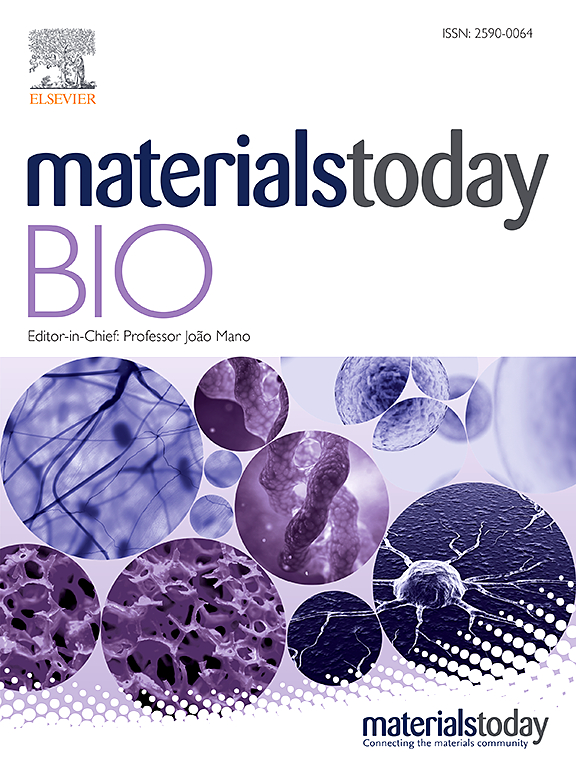Natural killer cell membrane manipulation for augmented immune synapse and anticancer efficacy
IF 8.7
1区 医学
Q1 ENGINEERING, BIOMEDICAL
引用次数: 0
Abstract
Natural killer (NK) cells are proving a powerful platform in cancer immunotherapy due to their innate cytotoxicity and ability to recognize tumor cells independently of antigen presentation. In preclinical and clinical studies, engineered NK cells expressing chimeric antigen receptors (CARs) have demonstrated strong antitumor efficacy, showcasing the potential of genetic reprogramming to enhance specificity and activation. In parallel, biomaterial-assisted surface engineering has gained momentum as a complementary strategy, offering a genome-independent and modular means of customizing NK cell functionality. Recent advances in covalent conjugation, metabolic glycoengineering, bio-orthogonal click chemistry, and hydrophobic insertion using biomaterials have facilitated the precise presentation of targeting ligands and immunomodulatory molecules directly onto the NK cell membrane. These strategies support programmable cell–tumor interactions, while maintaining the native cytotoxicity of NK cells. Although several challenges remain, including in vivo persistence and control of effector responses, surface engineering approaches offer practical advantages in flexibility, reversibility, and manufacturing. This review highlights key advances in NK cell-based cancer immunotherapy, with particular focus on: (1) the therapeutic potential and clinical application of native NK cells, (2) the development of CAR−NK cell platforms, and (3) emerging biomaterial-assisted surface engineering strategies to enhance immune synapse. Together, these developments expand the toolkit for NK cell-based therapies and suggest that material-guided engineering may play a valuable role alongside genetic strategies in shaping the next generation of cancer immunotherapy.
自然杀伤细胞膜操作增强免疫突触和抗癌功效
自然杀伤细胞(NK)由于其固有的细胞毒性和独立于抗原呈递的识别肿瘤细胞的能力,被证明是癌症免疫治疗的一个强大平台。在临床前和临床研究中,表达嵌合抗原受体(CARs)的工程化NK细胞显示出强大的抗肿瘤功效,显示了基因重编程增强特异性和激活的潜力。与此同时,生物材料辅助表面工程作为一种补充策略获得了动力,提供了一种基因组独立的模块化方法来定制NK细胞功能。最近在共价偶联、代谢糖工程、生物正交点击化学和疏水插入等方面的进展,已经促进了靶向配体和免疫调节分子直接在NK细胞膜上的精确呈现。这些策略支持可编程细胞-肿瘤相互作用,同时保持NK细胞的天然细胞毒性。尽管仍然存在一些挑战,包括体内持久性和效应反应的控制,但表面工程方法在灵活性、可逆性和制造方面具有实际优势。本文综述了基于NK细胞的癌症免疫治疗的关键进展,特别关注:(1)天然NK细胞的治疗潜力和临床应用,(2)CAR - NK细胞平台的发展,以及(3)新兴的生物材料辅助表面工程策略来增强免疫突触。总之,这些发展扩大了NK细胞治疗的工具箱,并表明材料引导工程可能与遗传策略一起在塑造下一代癌症免疫治疗中发挥重要作用。
本文章由计算机程序翻译,如有差异,请以英文原文为准。
求助全文
约1分钟内获得全文
求助全文
来源期刊

Materials Today Bio
Multiple-
CiteScore
8.30
自引率
4.90%
发文量
303
审稿时长
30 days
期刊介绍:
Materials Today Bio is a multidisciplinary journal that specializes in the intersection between biology and materials science, chemistry, physics, engineering, and medicine. It covers various aspects such as the design and assembly of new structures, their interaction with biological systems, functionalization, bioimaging, therapies, and diagnostics in healthcare. The journal aims to showcase the most significant advancements and discoveries in this field. As part of the Materials Today family, Materials Today Bio provides rigorous peer review, quick decision-making, and high visibility for authors. It is indexed in Scopus, PubMed Central, Emerging Sources, Citation Index (ESCI), and Directory of Open Access Journals (DOAJ).
 求助内容:
求助内容: 应助结果提醒方式:
应助结果提醒方式:


